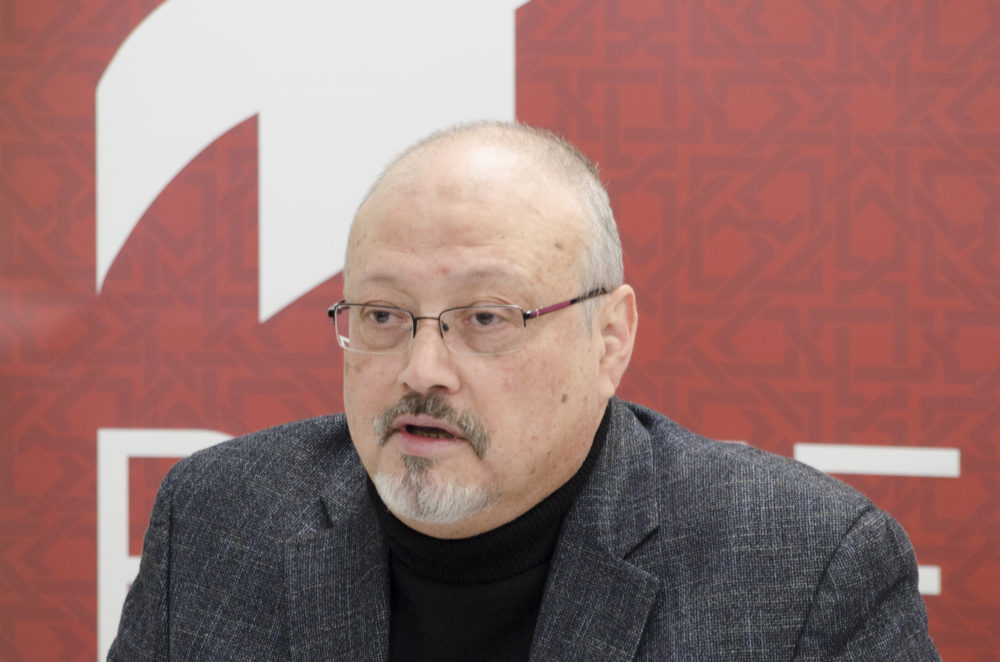
By Aminah Khan, Arts & Entertainment Editor, & Karen Phan, Staff Writer
The murder of journalist Jamal Khashoggi has sparked international outrage and created tension between the United States and Saudi Arabia. United States president Donald Trump is hesitant to punish Saudi Arabia because his agenda relies on good relationships with the country.
Khashoggi was a Saudi Arabian journalist for the Washington Post and a prominent critic of the Saudi Arabian government. His ties with the Saudi Royal Family go back to the 1930s, when his grandfather was the doctor of King Abdul Aziz, the founder of Saudi Arabia. The royal family and Khashoggi were close, but their relationship went sour when he began to criticize the monarchy. When Mohammed bin Salman (MBS) became crown prince in 2015 following the abdication of his father from the throne, Khashoggi was silenced from the state-run media. Frustrated with the Saudi government, Khashoggi left for the United States in self-imposed exile June of 2017.
Prior to his death, Khashoggi visited the Saudi Consulate unannounced in Istanbul, Turkey on Sept. 28 to obtain a marriage license. According to his fiancée Hatice Cengiz, Khashoggi hesitated going to the consulate because he feared the possibility of being captured and punished for his political views. Much his surprise, Khashoggi was warmly welcomed by consulate employees and felt he had nothing to worry about. He was killed when he returned to the consulate on Oct. 2.
A major concern to the American and Turkish governments is the inconsistency in the Saudi government’s response to the murder of Khashoggi. When allegations were first made by the Turkish government, the Saudi government denied any knowledge of Khashoggi’s death and said he left the consulate unharmed. It was later revealed that a body double appeared on security camera footage to falsely portray Khashoggi leaving the consulate unharmed.
On Oct. 8, MBS’s brother, Prince Khaled bin Salman and the Saudi ambassador to the United States released a joint letter stating the rumors about Khashoggi’s death were false.
“I don’t know who is behind these claims, or their intentions, nor do I care frankly,” the letter wrote.
With pressure from Congress and the media, Trump made a phone call to King Salman of Saudi Arabia on Oct. 15 and described the king’s denial of the assassination as credible.
On Oct. 20, the Saudi government released another press statement announcing that Khashoggi was killed in a fight inside the consulate that day. The government released its final story, stating that, although Khashoggi’s death was premeditated by 15 assassins as the Turkish government had first alleged, neither the crown prince nor the Saudi government had any knowledge or had any part in the assassination.
Suspicions about MBS’s involvement in the murder arose, especially because four of the 15 assassins were men who work close to MBS and were even a part of his security detail.
Despite the the evidence that suggests the assassination of Khashoggi was the crown prince’s doing, Trump is still hesitant and unlikely to place sanctions against Saudi Arabia. According to Secretary of State Mike Pompeo, Trump said the U.S has “important strategic relationships, national security relationships with the Kingdom of Saudi Arabia, and we intend to make sure that those relationships remain intact.”
The U.S. is a major weapons exporter to the Saudi Arabian government, even more so now with Saudi Arabia’s purchasing firearms to fight the ongoing war in Yemen.
“I don’t like it [Khashoggi’s assassination]. We don’t like it even a little bit, but as to whether or not we should stop 110 billion dollars from being spent in this country knowing they [Saudis] have four or five alternatives–that would not be acceptable to me,” said Trump.
Trump’s main concern with placing sanctions on Saudi Arabia is that they will turn to countries like Russia and China to purchase weapons from.
Trump defends his reluctance to place sanctions on Saudi Arabia by explaining how trade with the country helps create new jobs and boosts the economy, but many Congressional leaders are unsatisfied. They believe action must be taken against Saudi Arabia because of Khashoggi’s death, and that exporting weapons fuels Saudi Arabia’s brutal attacks on the Yemeni population.
The United Nations has ranked Yemen to be the country with the largest humanitarian crisis to date with 22.2 million citizens in need of assistance and over 2 million internally displaced persons in the country. With hundreds of thousands of people lacking job and food security, many are calling for an end to the onslaught of terror caused by the Saudi government.
By placing sanctions on Saudi Arabia, Trump can also push for an end to the 4-year-long civil war raging in Yemen. Although it is unlikely to occur, relentless pressure from his administration, cabinet and the population can force Trump to reconsider.
